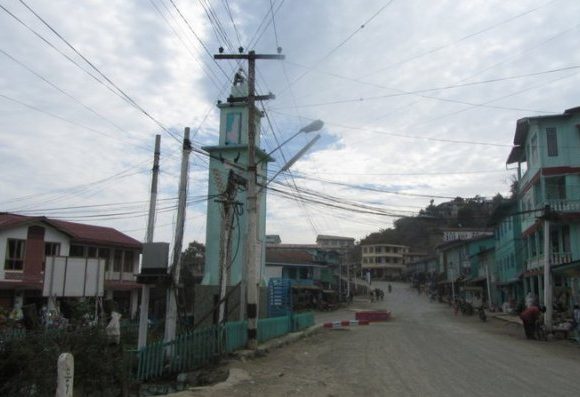The Sound of Silence
Most people will not be surprised to find in the news about the sad stories of ongoing oppression, persecution and violations of basic human rights in Burma, a country now called Myanmar by its military junta. But what is not often immediately obvious from the outside is the horrible and inhumane conditions people have been forced to silently endure under the successive rules of the country’s autocratic and tyrannical regimes for more than the last four decades.
Burma is a country characterized by its religious, cultural and ethnic diversity. One of the underlying problems facing Burma today is the politicization or misrepresentation of religion and ethnicity by the country’s ruling military regime, whose members identify strongly and intimately with Buddhism. There is no question that Buddhism is a peaceful religion. But it seems that Buddhism has been grossly misused and misrepresented by the ruling military regime.
When I look back into our documentation for the last ten years, its begin with the news about 5 Chin Christian children lured away and forced to become young Buddhist monks and nuns in 1995, and the last documentation as recently as June 2005 includes Chin Christian villagers forced to contribute labor, money and construction material for a Buddhist pagoda, where there was no Buddhist in the village.
When I and my colleagues founded Chin Human Rights Organization (CHRO), our intention was to document all incidents of human rights abuses against Chin people without focusing on a single issue. However, as time went on, it was quickly obvious that the issue of religious persecution was a matter of great concern to us. Not surprisingly, at least one piece of information in the reports that we gathered for our bimonthly newsletter, Rhododendron News, has had to do religious persecution against Chin Christians.
Starting from 1988, when present Burmese military regime come into power by killing thousands of innocent civilians, the presence of Burmese army in Chin State has increased up to ten times. Every section, platoon, company and battalion of Burmese army has one way or another committed human rights violations. Forced labor, extortion of money, arbitrary arrest, torture, and killing, rape and all kinds of human rights violations occurred on daily basis.
That seems insufficient for the Burmese military regime. With a slogan to ‘homogenize’ the country they brought the Hill Buddhist Mission to Chin State in order to expand Buddhism among Chin Christians. With this program, hundreds of Buddhist monks were migrated. And surprisingly, local people have discovered that many of the monks were not mere Buddhist missionaries, but have pistols and guns hidden under their robes. They have to be accompanied by a section of Burmese army whenever and wherever they travel and Chin Christian villagers are forced to listen to their preaching.
Those who converted to Buddhism are rewarded by exemption from forced labor, monthly stipend and education opportunity plus rice, sugar, cooking oil and basic commodity with specially low price, while the Christians are facing discrimination, intimidation and insult.
Since the first Chin conversion to Christianity in the early 1900s following the arrival of American missionaries, Christianity has been deeply entrenched in Chin society and has become part of the Chin cultural identity. And the Chins like to express their belief in Christianity by planting symbolic crosses near their village or town.
When the present Burmese military regime started militarization in Chin state since the early 1990s, the Chin Christians helplessly watch their church destroyed, their pastors humiliated, their sisters raped, their mother enslaved and their father tortured and killed, the crosses they have planted destroyed one by one and replaced by Buddhist pagodas where they were forced to contribute money, labor and construction materials.
As a human rights activist, I have witnessed and interviewed several victims of human rights violations. I can’t forget one of the pastors recount the ordeal of torture he has gone through at the hand of the Burmese military. His trembling voice and sweated face in air conditioned room expressed his suffering beyond words can convey. He never fully recovered both psychologically and physically, that he died a few years later of heart attack.
The force of evil is so strong. The only thing these persecuted Chin Christians can do in the brutal face of guns and brutalities is to pray in silence for justice.
I think I understand what isolation means as a person who was brought up in a small rural town of one of the most isolated area in a country that is one of the most isolated and repressive regimes in the world. And, I think I also understand what solidarity means as a person who have been desperately seeking peace and justice by protesting against the Socialist regime from the university campus, taking up arms as a guerilla fighter in the jungle, as a human rights activist lobbying at the United Nations, NGOs and GOs, and documenting and informing the world about the suffering of the people of Burma as much as I can.
The situation in Burma at present seems disheartening for those who advocate for justice. It seems that good is defeated by evil, and justice has been badly humiliated. However I have never lost hope believing that justice will prevail in the long run. My belief and conviction are strong enough to drive me forward to continue to advocate for change.
An Ethiopian proverb says “When spiders are united, they can tie down a lion”. I believe that there will be time when the sound of our silence prayer for justice will be heard by peace and justice lovers around the world and responded to with solidarity and action, the action that will tie down the lion of injustice.
[Salai Bawi Lian Mang is co-founder and director of Chin Human Rights Organization www.chro.org , and co-author of Religious Persecution: A Campaign of Ethnocide Against Chin Christian in Burma]]
By Salai Bawi Lian Mang
Response Asia Pacific Magazine (Summer-Fall 2005)
Hong Kong





